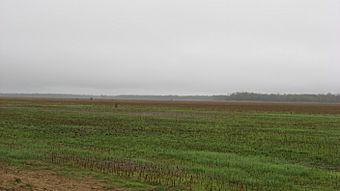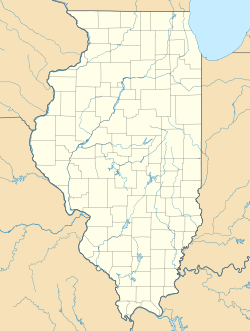Duffy site facts for kids
Quick facts for kids |
|
|
Duffy site
|
|

Overview of the site
|
|
| Location | Sally Hardin Rd., southeast of New Haven, Illinois |
|---|---|
| Area | 60 acres (24 ha) |
| NRHP reference No. | 77000485 |
| Added to NRHP | August 26, 1977 |
The Duffy site is an important archaeological site in Illinois, USA. It is located along the Wabash River, near the village of New Haven. This site helps us learn about ancient Native American cultures. It is a special place because of the unique pottery found there. The Duffy site is also the main example for something called the Duffy Complex. This is a group of similar ancient sites found along the Wabash River.
Contents
Discovering the Duffy Site
The Duffy site is a key location for understanding the past. It is found in Gallatin County, a part of southeastern Illinois. Archaeologists believe people lived here around the year 1000 AD. This means the site is over a thousand years old!
What Makes Duffy Special?
The pottery found at the Duffy site is very unique. The people who lived there made pots of different thicknesses. Their pottery usually had very few decorations. When there were decorations, they were simple lines or bars. These were either carved or stamped onto the pottery.
The pottery was also special because of how it was made. It was tempered with something called grog. Grog is crushed pieces of old pottery or clay. Adding grog makes the new pottery stronger.
Tools and Life at Duffy
Archaeologists have found other interesting items at Duffy. They found small, triangular projectile points. These points are often called "Mounds Stemless" points. They were likely used as tips for arrows or spears.
The people also made tools called celts. Celts are like ancient axes or chisels. The celts found at Duffy had a somewhat rectangular shape. These tools would have been important for daily tasks.
Connecting Duffy to Other Ancient Cultures
The Duffy site has connections to other ancient cultures in the region. One important connection is to the Yankeetown Complex. This complex is named after the Yankeetown site in Indiana.
Duffy and Yankeetown Pottery
Like the people at Duffy, the Yankeetown people also made grog-tempered pottery. Their pottery also had few decorations, mostly simple carvings. However, there were enough differences in the pottery styles. This suggests that the Duffy and Yankeetown people were not closely related.
Even with differences, the two sites shared some cultural ideas. Both Duffy and Yankeetown show signs of the Late Woodland period. This was a time when Native American groups were developing new ways of life.
The Yankeetown site also shows early signs of the Mississippian culture. This was a major Native American culture known for building large mounds. The Duffy site also shows some influence from the Mississippian culture. This suggests a time of change for the people living there.
Other Related Sites
Other sites in Illinois might also be connected to the Duffy Complex. The Carrier Mills Archaeological District in Saline County shows some Duffy influence. Another site is the Illinois Salines in Gallatin County. Pottery found there looks more like Duffy pottery than Yankeetown pottery. It seems the Duffy culture had some control over the Illinois Salines area. This was when the region was changing from the Late Woodland to the Mississippian period.
Protecting the Duffy Site
In 1977, the Duffy site was added to the National Register of Historic Places. This means it is recognized as an important historical or archaeological place. It was listed because of its great archaeological value. The Duffy site is one of seven places in Gallatin County on this important list.



